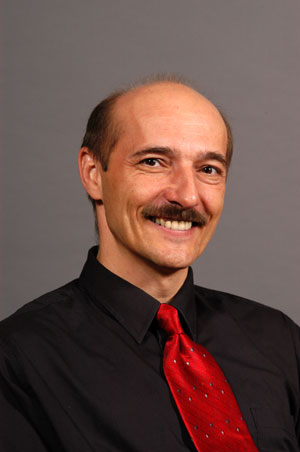Faculty Profile
Hans Pfister
Professor of Physics; George Wesley Pedlow Chair in Pedagogy (1991)Contact Information
Tome Scientific Building
717-245-1307
Bio
As an advocate for the environment he encourages sustainable living, supports sustainable technology, and embraces renewable energy sources. While trained as a plasma physicist and always a plasma physicist at heart, he spent the past two decades designing, building, testing, and reengineering several solar collectors, amongst them numerous Solar Air Heaters (SAHs). These are devices that convert solar energy directly into hot air, with the purpose of heating houses and buildings. He has also designed and built thermal storage devices based on Phase Change Materials. One of his latest schemes, Active Glazing Loss Reduction (AGLR) focusses on reducing thermal loss through the glazing of SAHs. He is also known for his numerous kinesthetic physics experiments, incorporating his students into the experiment, thus allowing them to feel the forces and accelerations on their own body. Other interests include physics puzzles, tricks, and toys, as applied to the physics classroom.
Education
- Staatsexam, Eberhard Karls Universitat, 1981
- Ph.D., University of California at Los Angeles, 1991
2025-2026 Academic Year
Fall 2025
PHYS 131 Workshop Physics
An introduction to classical mechanics using an inquiry-based, hands-on approach that combines cooperative learning with the use of computer tools for data acquisition, analysis, and mathematical modeling. Both analytic and numerical calculations are introduced for characterizing motion. A selection of kinesthetic experiments is included to enhance student learning. Topics include kinematics, Newton's laws of motion, gravitation, conservation laws, and rotational motion. Recommended for physical science, mathematics, and pre-engineering students and for biology majors preparing for graduate study. Three two-hour sessions per week. Because of the similarity in course content, students will not receive graduation credit for both 131 and 141. Prerequisite: Completion of, or concurrent enrollment in, MATH 151 or 170.
PHYS 491 Advanced Laboratory Capstone I
In this capstone experience, students will work in groups to study several advanced physics topics in detail. Potential topics include muon decay, microwave diffraction, the speed of light, pulsed nuclear magnetic resonance, and the Hall effect. The course emphasizes collaborative research, investigative techniques, oral and written communication. Prerequisite: Physics major senior status. The physics major requires either the two-semester sequence of 491 & 492 OR two semesters of PHYS 550.
Spring 2026
PHYS 132 Workshop Physics
Workshop Physics: Matter and Fields
An introduction to thermal physics and electromagnetism using an inquiry-based, hands-on approach that combines cooperative learning with the use of computer tools for data acquisition, analysis, and mathematical modeling. Both analytic and numerical calculations are introduced for characterizing motion. A selection of kinesthetic experiments is included to enhance student learning. Topics include heat, temperature, phases of matter, kinetic theory, and heat engines; electric and magnetic fields, forces on charged particles, electrical circuits, and Ohm’s and Kirchhoff’s law; an introduction to Maxwell’s equations and electromagnetic waves.
Three two-hour sessions per week. (Students enrolled in Physics 132 who have completed Mathematics 170 are encouraged to continue their mathematics preparation while taking physics by enrolling in Mathematics 171.) Because of the similarity in course content, students will not receive graduation credit for both 132 and 142. Prerequisite: 131 and completion of, or concurrent enrollment in MATH 170.
PHYS 211 Vibrations, Waves & Optics
Completion of both PHYS 211 and PHYS 212 fulfills the WID Requirement.
